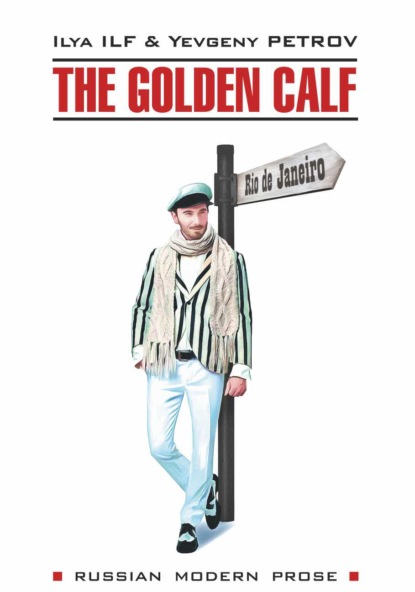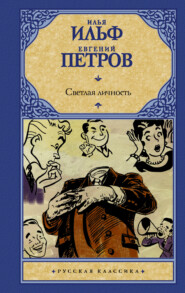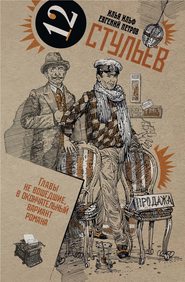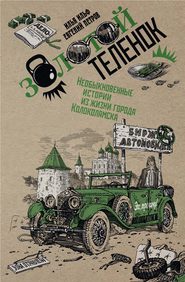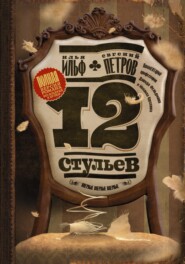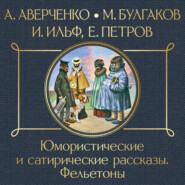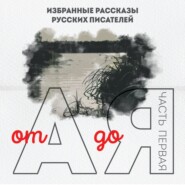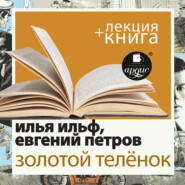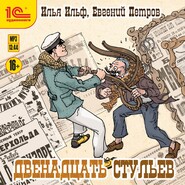По всем вопросам обращайтесь на: info@litportal.ru
(©) 2003-2024.
✖
Золотой теленок / The Golden Calf
Автор
Жанр
Серия
Год написания книги
1931
Теги
Настройки чтения
Размер шрифта
Высота строк
Поля
“Help me!” yelled out Panikovsky as the car caught up with him.
“Not today,” said Balaganov, hanging over the side.
The car shrouded Panikovsky with clouds of crimson dust.
“Take me with you!” screamed Panikovsky, desperately trying to keep up with the car.
“I am good!”
The voices of the individual pursuers blended into a roar of disapproval.
“Shall we take the bastard?” enquired Ostap.
“No, don’t,” said Balaganov harshly, “that’ll teach him to break pacts.”
But Ostap had already made the decision.
“Drop the bird!” he yelled to Panikovsky; then he turned to the driver and added quietly, “Dead slow.”
Panikovsky immediately obeyed. The goose got up from the ground looking displeased, scratched itself, and started walking back to town as if nothing had happened.
“Get in,” invited Ostap. “What the hell. But don’t sin any more, or I’ll rip your arms out of their sockets.”
Panikovsky grabbed the edge of the car, then leaned into it and, beating the air with his legs, rolled himself inside, like a swimmer into a boat. He fell to the floor, his stiff cuffs knocking loudly.
“Full speed ahead,” ordered Ostap. “Our deliberations continue.”
Balaganov squeezed the rubber bulb, and the brass horn produced the cheerful strains of an old-fashioned Brazilian tango that cut off abruptly:
The Maxixe is fun to dance.
Ta-ra-ta…
The Maxixe is fun to dance.
Ta-ra-ta…
And the Antelope tore out into the wilderness, towards the barrel of aviation fuel.
Chapter 4. A plain-looking suitcase
A man without a hat walked out of the small gate of building number sixteen, his head bowed. He wore gray canvas pants, leather sandals without socks, like a monk, and a white collarless shirt. Stepping onto the flat, bluish stones of the sidewalk, he stopped and said quietly to himself:
“Today is Friday. That means I have to go to the train station again.”
Having uttered these words, the man in sandals quickly looked over his shoulder. He had a hunch that a man, wearing the impenetrable expression of a spy, was standing behind him. But Lesser Tangential Street was completely empty.
The June morning was just beginning to take shape. Acacia trees were gently trembling and dropping cold metallic dew on the flat stones. Little birds were chirping some cheerful nonsense. The heavy molten sea blazed at the end of the street below, beyond the roofs. Young dogs, looking around sadly and making tapping sounds with their nails, were climbing onto trash cans. The hour of the street sweepers had ended, and the hour of the milk delivery women hadn’t started yet.
It was that time, between five and six in the morning, when the street sweepers, having swung their bristly brooms enough, returned to their shacks, and the city is light, clean, and quiet, like a state bank. At moments like this, one feels like crying and wants to believe that yogurt is indeed tastier and healthier than vodka. But one can already hear the distant rumble of the milk delivery women, who are getting off commuter trains with their cans. They will rush into the city and bicker with housewives at back doors. Factory workers with lunch bags will appear for a brief moment and then immediately disappear behind factory gates. Smoke will start billowing from the stacks. And then, jumping angrily on their night stands, myriad alarm clocks will start ringing their hearts out (those of the Paul Buhre brand a bit quieter, those from the Precision Mechanics State Trust a bit louder), and half-awake office workers will start bleating and falling off their high single beds. The hour of the milk delivery women will be over, and the hour of the office dwellers will begin.
But it was still early, and the clerks were still asleep under their ficus. The man in sandals walked through the entire city, seeing almost no one on the way. He walked under the acacias, which performed certain useful functions in Chernomorsk: some had dark blue mailboxes that were emblazoned with the postal logo (an envelope with a lightning bolt) hanging on them, others had metal water bowls, for dogs, attached to them with chains.
The man in sandals arrived at the Seaside Station just when the milk delivery women were leaving the building. After a few painful encounters with their iron shoulders, the man approached the luggage room and handed over a receipt. The attendant glanced at the receipt – with the unnatural seriousness that is unique to railroad personnel – and promptly tossed a suitcase to him. For his part, the man opened a small leather wallet, sighed, took out a ten-kopeck coin, and put it on the counter, which was made of six old rails that had been polished by innumerable elbows.
Back on the square in front of the station, the man in sandals put the suitcase down on the pavement, looked it over carefully, and even touched the small metal lock. It was a plain-looking suitcase that had been slapped together from a few wooden planks and covered with man-made fabric. If this kind of suitcase belongs to a younger passenger, it usually contains cotton Sketch socks, two spare shirts, a hairnet, some underwear, a brochure entitled The Goals of the Young Communist League in the Countryside, and three squished boiled eggs. Plus, there’s always a roll of dirty laundry wrapped in the newspaper Economic Life and tucked in the corner. Older passengers use this kind of suitcase to carry a full suit and a separate pair of pants (made of “Odessa Centennial” checkered fabric), a pair of suspenders, a pair of closed-back slippers, a bottle of eau-de-cologne, and a white Marseilles blanket. It should be noted that in these cases there’s also something wrapped in Economic Life and tucked in the corner, except that instead of dirty laundry it’s a pale boiled chicken.
Satisfied with this perfunctory inspection, the man in sandals picked up the suitcase and boarded a tropical-white streetcar that took him to the Eastern Station at the other end of the city. Here, he reversed the process he had just completed at the Seaside Station – he checked his suitcase in at the luggage room and obtained a receipt from the imposing attendant. Having completed this unusual ritual, the owner of the suitcase left the station just as the streets were beginning to fill up with the most exemplary of the clerks. He quickly joined their disorderly ranks, and his outfit immediately lost all its strangeness. The man in sandals was an office worker, and almost every office worker in Chernomorsk followed an unwritten dress code: a night shirt with sleeves rolled up above the elbows, light, orphanage-style pants, and those same sandals, or canvas shoes. Nobody wore a hat. One could occasionally spot a cap, but a mane of wild black hair standing on end was much more common, and a bald, sun-tanned pate, glimmering like a melon lying in the field and tempting you to write something on it with an indelible pencil, was more common still.
The organization where the man in sandals worked was called The Hercules, and it occupied a former hotel. Revolving glass doors with brass steamboat handles propelled him into a large, pink marble hallway. The elevator was permanently moored on the first floor, and it served as an information booth – one could already see a woman’s laughing face inside. Having run a few steps, thanks to the momentum given to him by the door, the newcomer stopped in front of an old doorman, who was wearing a cap with a golden zigzag, and asked cheerily:
“So, old man, are you ready for the crematorium?”
“Ready, my friend,” answered the doorman with a broad smile, “ready for our Soviet columbarium.”
He even waived his hands in excitement. His kindly face showed a willingness to submit himself to the fiery ritual at any moment.
The Chernomorsk authorities were planning to build a crematorium – along with a space called a columbarium, for funeral urns – and for some reason this novelty, courtesy of the municipal cemetery department, delighted the citizens to no end. Maybe they thought the new words – crematorium and columbarium – were funny, or maybe they were particularly amused by the thought that a human body can be burned like a log. Either way, they pestered elderly people in the streets and on streetcars with comments like: “Where are you charging off to, old woman? To the crematorium?” Or: “Let the old man pass, he’s off to the crematorium.” Surprisingly, the old folks liked the idea of cremation very much, and they responded good-naturedly to all jokes on the subject. In general, all that talk about dying, which was previously considered inappropriate and impolite, had come to enjoy universal popularity in Chernomorsk and was considered as entertaining as Jewish and Armenian jokes.
The man skirted a naked marble woman that stood at the bottom of the stairs, an electric torch in her raised hand, and threw a quick annoyed look at the poster that said, THE PURGE OF THE HERCULES BEGINS. DOWN WITH THE CONSPIRACY OF SILENCE AND CRONYISM. Then he climbed the stairs to the second floor. He worked in the Department of Finance and Accounting.
It was still fifteen minutes before the official start of the workday, but the others – Sakharkov, Dreyfus, Tezoimenitsky, Musicant, Chevazhevskaya, Kukushkind, Borisokhlebsky, and Lapidus Jr. – were already at their desks. They weren’t worried about the purge at all, and repeatedly reassured one another that they weren’t, but lately, for some reason, they had started coming to work earlier and earlier. Taking advantage of the few minutes of free time, they were chatting loudly among themselves. Their voices boomed across the huge hall, which was once the hotel’s restaurant. Its oak-paneled ceiling, which was covered with carvings, and the murals of frolicking dryads and other nymphs, with dreadful smiles on their faces, were evidence of its past.
“Have you heard the news, Koreiko?” Lapidus Jr. asked the new arrival. “You really haven’t? Then you won’t believe it.”
“What news? Good morning, Comrades,” said Koreiko. “Good morning, Anna Vasilevna.”
“You can’t even imagine!” said Lapidus Jr. gleefully. “Accountant Berlaga is in the nuthouse.”
“Are you serious? Berlaga? He’s the most normal person in the world!”
“Was the most normal until yesterday, but now he’s the least normal,” chimed in Borisokhlebsky. “It’s true. His brotherin-law called me. Berlaga has a very serious mental illness, the heel nerve disorder.”
“The only surprising thing is that the rest of us don’t have this nerve disorder yet,” remarked old Kukushkind darkly, looking at his co-workers through his round, wire-rimmed glasses.
“Bite your tongue,” said Chevazhevskaya. “He’s always so depressing.”
“It’s really too bad about Berlaga,” said Dreyfus, turning his swivel chair towards the others.
The others silently agreed with Dreyfus. Only Lapidus Jr. smirked mysteriously. The conversation moved on to the behavior of the mentally ill. They mentioned a few maniacs, and told a few stories about notorious madmen.
“I had a crazy uncle,” reported Sakharkov, “who thought he was simultaneously Abraham, Isaac, and Jacob. You can imagine the ruckus he raised!”
“The only surprising thing,” said old Kukushkind in a scratchy voice, methodically wiping off his glasses with the flap of his jacket, “the only surprising thing is that the rest of us don’t yet think that we are Abraham.” The old man started puffing, “… Isaac…”
“And Jacob?” asked Sakharkov teasingly.
“That’s right! And Jacob!” shrieked Kukushkind suddenly. “And Jacob! Yes, Jacob. We live in such unnerving times… When I worked at the banking firm of Sycamorsky and Cesarewitch they didn’t have any purges.”
“Not today,” said Balaganov, hanging over the side.
The car shrouded Panikovsky with clouds of crimson dust.
“Take me with you!” screamed Panikovsky, desperately trying to keep up with the car.
“I am good!”
The voices of the individual pursuers blended into a roar of disapproval.
“Shall we take the bastard?” enquired Ostap.
“No, don’t,” said Balaganov harshly, “that’ll teach him to break pacts.”
But Ostap had already made the decision.
“Drop the bird!” he yelled to Panikovsky; then he turned to the driver and added quietly, “Dead slow.”
Panikovsky immediately obeyed. The goose got up from the ground looking displeased, scratched itself, and started walking back to town as if nothing had happened.
“Get in,” invited Ostap. “What the hell. But don’t sin any more, or I’ll rip your arms out of their sockets.”
Panikovsky grabbed the edge of the car, then leaned into it and, beating the air with his legs, rolled himself inside, like a swimmer into a boat. He fell to the floor, his stiff cuffs knocking loudly.
“Full speed ahead,” ordered Ostap. “Our deliberations continue.”
Balaganov squeezed the rubber bulb, and the brass horn produced the cheerful strains of an old-fashioned Brazilian tango that cut off abruptly:
The Maxixe is fun to dance.
Ta-ra-ta…
The Maxixe is fun to dance.
Ta-ra-ta…
And the Antelope tore out into the wilderness, towards the barrel of aviation fuel.
Chapter 4. A plain-looking suitcase
A man without a hat walked out of the small gate of building number sixteen, his head bowed. He wore gray canvas pants, leather sandals without socks, like a monk, and a white collarless shirt. Stepping onto the flat, bluish stones of the sidewalk, he stopped and said quietly to himself:
“Today is Friday. That means I have to go to the train station again.”
Having uttered these words, the man in sandals quickly looked over his shoulder. He had a hunch that a man, wearing the impenetrable expression of a spy, was standing behind him. But Lesser Tangential Street was completely empty.
The June morning was just beginning to take shape. Acacia trees were gently trembling and dropping cold metallic dew on the flat stones. Little birds were chirping some cheerful nonsense. The heavy molten sea blazed at the end of the street below, beyond the roofs. Young dogs, looking around sadly and making tapping sounds with their nails, were climbing onto trash cans. The hour of the street sweepers had ended, and the hour of the milk delivery women hadn’t started yet.
It was that time, between five and six in the morning, when the street sweepers, having swung their bristly brooms enough, returned to their shacks, and the city is light, clean, and quiet, like a state bank. At moments like this, one feels like crying and wants to believe that yogurt is indeed tastier and healthier than vodka. But one can already hear the distant rumble of the milk delivery women, who are getting off commuter trains with their cans. They will rush into the city and bicker with housewives at back doors. Factory workers with lunch bags will appear for a brief moment and then immediately disappear behind factory gates. Smoke will start billowing from the stacks. And then, jumping angrily on their night stands, myriad alarm clocks will start ringing their hearts out (those of the Paul Buhre brand a bit quieter, those from the Precision Mechanics State Trust a bit louder), and half-awake office workers will start bleating and falling off their high single beds. The hour of the milk delivery women will be over, and the hour of the office dwellers will begin.
But it was still early, and the clerks were still asleep under their ficus. The man in sandals walked through the entire city, seeing almost no one on the way. He walked under the acacias, which performed certain useful functions in Chernomorsk: some had dark blue mailboxes that were emblazoned with the postal logo (an envelope with a lightning bolt) hanging on them, others had metal water bowls, for dogs, attached to them with chains.
The man in sandals arrived at the Seaside Station just when the milk delivery women were leaving the building. After a few painful encounters with their iron shoulders, the man approached the luggage room and handed over a receipt. The attendant glanced at the receipt – with the unnatural seriousness that is unique to railroad personnel – and promptly tossed a suitcase to him. For his part, the man opened a small leather wallet, sighed, took out a ten-kopeck coin, and put it on the counter, which was made of six old rails that had been polished by innumerable elbows.
Back on the square in front of the station, the man in sandals put the suitcase down on the pavement, looked it over carefully, and even touched the small metal lock. It was a plain-looking suitcase that had been slapped together from a few wooden planks and covered with man-made fabric. If this kind of suitcase belongs to a younger passenger, it usually contains cotton Sketch socks, two spare shirts, a hairnet, some underwear, a brochure entitled The Goals of the Young Communist League in the Countryside, and three squished boiled eggs. Plus, there’s always a roll of dirty laundry wrapped in the newspaper Economic Life and tucked in the corner. Older passengers use this kind of suitcase to carry a full suit and a separate pair of pants (made of “Odessa Centennial” checkered fabric), a pair of suspenders, a pair of closed-back slippers, a bottle of eau-de-cologne, and a white Marseilles blanket. It should be noted that in these cases there’s also something wrapped in Economic Life and tucked in the corner, except that instead of dirty laundry it’s a pale boiled chicken.
Satisfied with this perfunctory inspection, the man in sandals picked up the suitcase and boarded a tropical-white streetcar that took him to the Eastern Station at the other end of the city. Here, he reversed the process he had just completed at the Seaside Station – he checked his suitcase in at the luggage room and obtained a receipt from the imposing attendant. Having completed this unusual ritual, the owner of the suitcase left the station just as the streets were beginning to fill up with the most exemplary of the clerks. He quickly joined their disorderly ranks, and his outfit immediately lost all its strangeness. The man in sandals was an office worker, and almost every office worker in Chernomorsk followed an unwritten dress code: a night shirt with sleeves rolled up above the elbows, light, orphanage-style pants, and those same sandals, or canvas shoes. Nobody wore a hat. One could occasionally spot a cap, but a mane of wild black hair standing on end was much more common, and a bald, sun-tanned pate, glimmering like a melon lying in the field and tempting you to write something on it with an indelible pencil, was more common still.
The organization where the man in sandals worked was called The Hercules, and it occupied a former hotel. Revolving glass doors with brass steamboat handles propelled him into a large, pink marble hallway. The elevator was permanently moored on the first floor, and it served as an information booth – one could already see a woman’s laughing face inside. Having run a few steps, thanks to the momentum given to him by the door, the newcomer stopped in front of an old doorman, who was wearing a cap with a golden zigzag, and asked cheerily:
“So, old man, are you ready for the crematorium?”
“Ready, my friend,” answered the doorman with a broad smile, “ready for our Soviet columbarium.”
He even waived his hands in excitement. His kindly face showed a willingness to submit himself to the fiery ritual at any moment.
The Chernomorsk authorities were planning to build a crematorium – along with a space called a columbarium, for funeral urns – and for some reason this novelty, courtesy of the municipal cemetery department, delighted the citizens to no end. Maybe they thought the new words – crematorium and columbarium – were funny, or maybe they were particularly amused by the thought that a human body can be burned like a log. Either way, they pestered elderly people in the streets and on streetcars with comments like: “Where are you charging off to, old woman? To the crematorium?” Or: “Let the old man pass, he’s off to the crematorium.” Surprisingly, the old folks liked the idea of cremation very much, and they responded good-naturedly to all jokes on the subject. In general, all that talk about dying, which was previously considered inappropriate and impolite, had come to enjoy universal popularity in Chernomorsk and was considered as entertaining as Jewish and Armenian jokes.
The man skirted a naked marble woman that stood at the bottom of the stairs, an electric torch in her raised hand, and threw a quick annoyed look at the poster that said, THE PURGE OF THE HERCULES BEGINS. DOWN WITH THE CONSPIRACY OF SILENCE AND CRONYISM. Then he climbed the stairs to the second floor. He worked in the Department of Finance and Accounting.
It was still fifteen minutes before the official start of the workday, but the others – Sakharkov, Dreyfus, Tezoimenitsky, Musicant, Chevazhevskaya, Kukushkind, Borisokhlebsky, and Lapidus Jr. – were already at their desks. They weren’t worried about the purge at all, and repeatedly reassured one another that they weren’t, but lately, for some reason, they had started coming to work earlier and earlier. Taking advantage of the few minutes of free time, they were chatting loudly among themselves. Their voices boomed across the huge hall, which was once the hotel’s restaurant. Its oak-paneled ceiling, which was covered with carvings, and the murals of frolicking dryads and other nymphs, with dreadful smiles on their faces, were evidence of its past.
“Have you heard the news, Koreiko?” Lapidus Jr. asked the new arrival. “You really haven’t? Then you won’t believe it.”
“What news? Good morning, Comrades,” said Koreiko. “Good morning, Anna Vasilevna.”
“You can’t even imagine!” said Lapidus Jr. gleefully. “Accountant Berlaga is in the nuthouse.”
“Are you serious? Berlaga? He’s the most normal person in the world!”
“Was the most normal until yesterday, but now he’s the least normal,” chimed in Borisokhlebsky. “It’s true. His brotherin-law called me. Berlaga has a very serious mental illness, the heel nerve disorder.”
“The only surprising thing is that the rest of us don’t have this nerve disorder yet,” remarked old Kukushkind darkly, looking at his co-workers through his round, wire-rimmed glasses.
“Bite your tongue,” said Chevazhevskaya. “He’s always so depressing.”
“It’s really too bad about Berlaga,” said Dreyfus, turning his swivel chair towards the others.
The others silently agreed with Dreyfus. Only Lapidus Jr. smirked mysteriously. The conversation moved on to the behavior of the mentally ill. They mentioned a few maniacs, and told a few stories about notorious madmen.
“I had a crazy uncle,” reported Sakharkov, “who thought he was simultaneously Abraham, Isaac, and Jacob. You can imagine the ruckus he raised!”
“The only surprising thing,” said old Kukushkind in a scratchy voice, methodically wiping off his glasses with the flap of his jacket, “the only surprising thing is that the rest of us don’t yet think that we are Abraham.” The old man started puffing, “… Isaac…”
“And Jacob?” asked Sakharkov teasingly.
“That’s right! And Jacob!” shrieked Kukushkind suddenly. “And Jacob! Yes, Jacob. We live in such unnerving times… When I worked at the banking firm of Sycamorsky and Cesarewitch they didn’t have any purges.”





